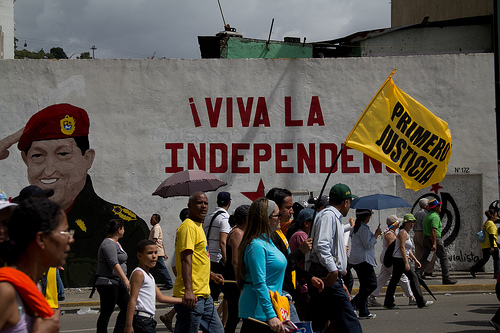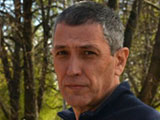Venezuela Faces a New Electoral Challenge
by Israel Centeno / September 25, 2012 / 1 Comment
Will an election be enough to change the government?

Photo: JoséMa Orsini. March in Support of Henrique Capriles. June 10, 2012.
In the 1990s, via the theories of the anti-Semitic and fascist Argentinean Norberto Ceresole, Hugo Chávez found the keys to what would become the dialectics of his “revolution.” There would be two central themes:

- From his lonely watch post Albert Camus asked who among us has not experienced exile yet still managed to preserve a spark of fire in their soul. “We’re all alone,” Natalia Sedova cried in exile on hearing of her husband Leon Trotsky’s affair with Frida Kahlo. In his novel Night Watch, Stephen Koch follows the incestuous love affair of David and Harriet, wealthy siblings watching the world from their solitary exile. Koch’s writing, Camus’s theories, and Trotsky’s affair all come back to exile and lead me to reflect on the human condition. From my own vantage point, my Night Watch, I will reflect on my questions of exile, writing, and the human condition.

- Israel Centeno was born in 1958 in Caracas, Venezuela, and currently lives in Pittsburgh as a Writer-in-Residence with City of Asylum/Pittsburgh. He writes both novels and short stories, and also works as an editor and professor of literature. He has published nine books in Venezuela and three in Spain.
1) The destruction of democratic institutionalism in Venezuela, replaced by a new power relation upheld by a caudillo embodying the fusion of the army and the people.
2) The promotion of a third political force on the international scene, supporting multipolarity and born from an alliance between Saddam Hussein’s Iraq, the Ayatollahs’ Iran, al-Assad’s Syria, and Gaddafi’s Libya.
On this basis, Chávez was elected into power, following two attempted coups d’état. Why the middle class and the convergence of seemingly contradictory factors supported him—thus guaranteeing his success—is explained in greater detail by the author and poet Guillermo Sucre in his article “Democratura.”
The only significant promise kept by Chávez in his 14 years of “revolution” was to call a constitutional assembly, which served not just to change the Constitution, but also to begin dismantling democratic institutionalism. Later on, by means of paradigmatic crises spurred on by his political operatives, and in violation of the newly-formed Constitution, the caudillo-president transferred the Judicial Branch, parliament, electoral arbiter, and the army under his direct control.
It’s difficult to give a name to this unprecedented pantomime. One could think up a short list of neologisms. As I understand it, it is not in the style of Fidel, Perón, nor Gaddafi, nor inspired by Noriega, nor in support of Nasser, Fujimori, nor Mugabe. It is a contradiction; the sum total of all authoritarian models with added cynicism, nihilism, and impunity.
Chávez’s anti-USA speech has been enough to win the sympathy of the left-wing paparazzi, who have forgotten that Franco, Salazar, and even Somoza and Pinochet (the latter two at the time of Jimmy Carter) intensely disliked the United States. For a selection of the left-wing intelligentsia, it’s enough to bring back, as in Chávez’s speech, the anti-capitalist clichés of the 1960s, or subscribe to the conspiracy theories circulating the Internet, almost all of them connected to neo-Nazi groups.
Now Venezuelans are once again faced with the powerful muscle of a State controlled by Chávez. In spite of the bias shown by the electoral arbiter and the army, and the incumbent’s threats of civil war (as if we weren’t still immersed in a war that has claimed a shocking number of victims over the last 14 years), on the streets there is a united force. Challenged day after day by an agenda of violence imposed by pro-Chávez groups, the united factors insist upon finding a way to change—an alternative. But this change will only be significant if, in addition to defeating and displacing the multiform Hugo Chávez, Henrique Capriles and his accompanying forces rebuild independent, democratic institutionalism that, by means of a nationally-agreed government, promotes a modern State to resolve the issues of poverty, profitable employment, health, and education.
Translation: Kelly V. Harrison





One Comment on "Venezuela Faces a New Electoral Challenge"
Venezuela won’t become a democracy – because it already is a democracy. Every state city and district has representatives both for and against Chavez. People are free to vote or stand if they wish, free to protest both for and against Chavez and the PSUV in newspapers, streets, parks and pulpits. Hugo Chavez will probably win – because he is Latin America’s second most popular leader. Why? free education from pre-school to university. free health care including dental, subsidised food fuel and transport & unemployment lowest it has been for decades.